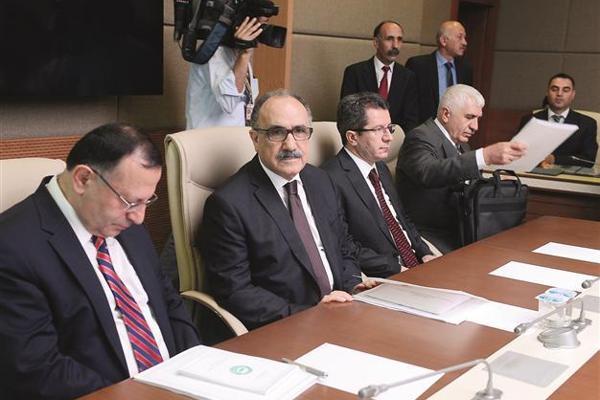No end in sight for cacophony on Kurdish reform bill
ANKARA


The commission working on the Kurdish reform bill is led by Deputy Prime Minister Beşir Atalay (2L). Atalay says the primary goal is the laying down of arms. AA Photo
The government has defended the bill it has initiated with the intention of advancing the stalled peace process with the outlawed Kurdish Workers’ Party (PKK), claiming it is a “framework law,” amid debate among the opposition parties over its matter.The debates at the General Assembly over the bill began July 8, as it went to the floor after having been adopted by the Parliament’s Internal Affairs Commission on July 4.
“The resolution process is a continuation of our earlier efforts and it is in a phase of maturing,” Deputy Prime Minister Beşir Atalay said on July 8, as he took the floor on behalf of the government and explained how the ruling Justice and Development Party (AKP) has been seeking unusual resolutions to problems.
“Our next primary goal is the laying down of arms by members of the organization and having the state carry on necessary work for return of these people to their homes and normal lives,” Atalay said of the resolution/peace process intended to end the three-decade-long conflict between Turkey’s security forces and the PKK in order to pave the way for a peaceful resolution to the Kurdish issue.
“This law is important because it is the first law regarding the resolution process that has come to Parliament. This is an abstract law, a framework law. We are officially giving a name to the resolution process and putting Parliament in charge,” he said. “We are working on a concrete roadmap. The action plan will reveal these steps and perhaps, new laws will be necessary,” he added.
The debates come weeks ahead of the country’s presidential elections, in which Prime Minister Recep Tayyip Erdoğan is running, and could help him win Kurdish votes.
The law would allow the government to take all measures it deems necessary to move the talks forward, including steps to grant amnesty to Kurdish militants who lay down arms. Officials involved in talks with the group – formally designated as a terrorist organization – would be immune from prosecution.
Last year, PKK militants agreed to a ceasefire but later halted the withdrawal of fighters from Turkey, saying the government had not kept its promises.
Turkish media reports said the militants would resume their withdrawal in September.
During the same session on July 8, the main opposition Republican People’s Party (CHP) reiterated its objection to Article 4 of the bill, which grants broad immunity to those who were involved in negotiations with the PKK. CHP Deputy Chair Sezgin Tanrıkulu, nonetheless, also reiterated the party’s institutional decision to support the bill, hoping it would serve as “a means to finalize the Kurdish question at a permanent pace.”
The Nationalist Movement Party (MHP) suggested that “the resolution process nonsense” has extremely strengthened the PKK and encouraged more to join the armed forces of the PKK in the mountains.
MHP deputy Sinan Oğan vowed his party would do their best to block this bill, which has been presented to “appease the PKK.”
People’s Democracy Party (HDP) deputy Sebahat Tuncel argued that the government has not been acting courageous enough to resolve the issue and the bill is “ambiguous.” Still, Tuncel noted the importance her party attaches to the process since it would stop killing of people.
Another HDP deputy, Sırrı Süreyya Önder, meanwhile, maintained the issue should not be framed as a “public order or a problem relating to terrorism,” but should instead be presented as “a national problem.”
Önder also criticized the phrase “rehabilitation” in the bill and offered the use of “mutual harmony and integration,” since these concepts would be better fit to the spirit of the process.
